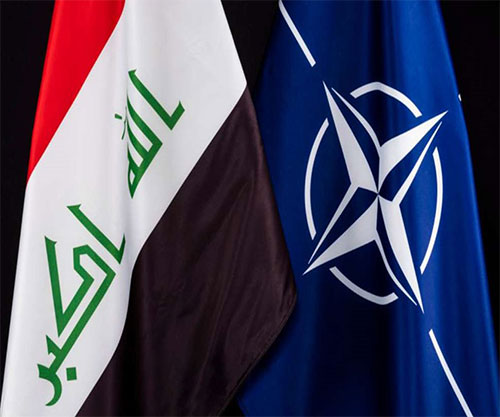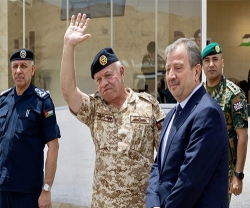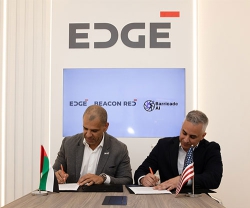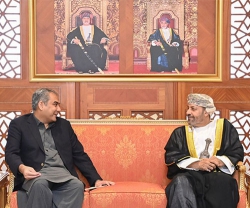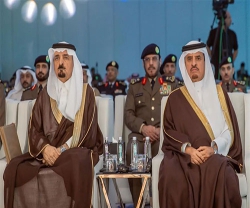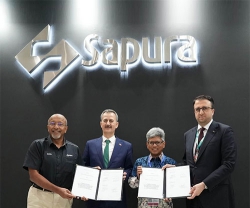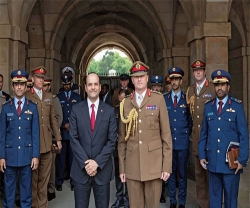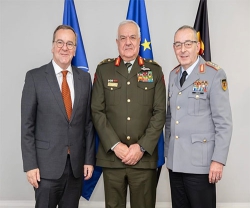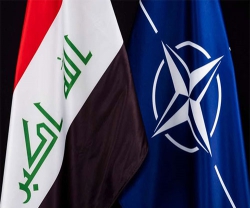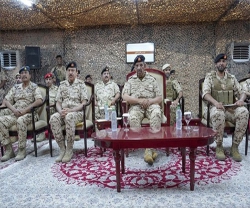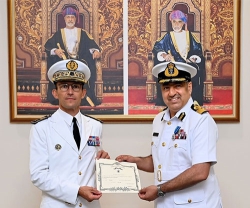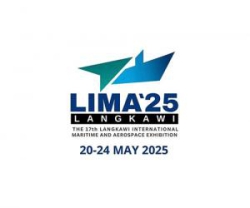Iraq and the North Atlantic Treaty Organisation (NATO) held talks in Baghdad Wednesday to review and strengthen their strategic partnership.
The discussions took place during the second session of the high-level strategic dialogue between Iraq and NATO. The Iraqi side was led by National Security Adviser Qasim al-Araji, while the NATO delegation was headed by Assistant Secretary-General for Operations Thomas Goffus.
According to an official statement from al-Araji's office, the talks focused on enhancing strategic cooperation in line with Iraq’s long-term vision, particularly amid evolving regional developments.
The two sides also discussed efforts to build the capacities of Iraqi security institutions through comprehensive training packages delivered under the NATO advisory mission in Iraq.
Al-Araji reaffirmed the Iraqi government’s strong interest in the NATO mission, emphasising its advisory and non-combat nature.
Goffus, in turn, reiterated NATO’s support for Iraq and its vital role in promoting regional stability, stressing that the mission operates in full alignment with the Iraqi government’s requirements and within the framework of applicable laws.
NATO and Iraq are engaged in political dialogue and practical cooperation aimed at developing the capacity of Iraq’s security forces, its defence and security institutions, and its national defence academies, according to NATO.
Following the defeat of ISIS in Iraq and the restoration of sovereign control of all its territory in late 2017, NATO scaled up its training and advising efforts in Iraq at the government’s request. In February 2021 NATO Defence Ministers, and in August 2023 the North Atlantic Council, agreed to expand NATO Mission in Iraq at the request of the Iraqi government.
Cooperation between NATO and Iraq is based on principles of respect for sovereignty, international law, joint ownership and mutual benefit. The partnership serves to anchor and bolster Iraq's capacity to contribute constructively to regional security. It reflects NATO's long-standing commitment to the development of Iraq's capabilities to address shared challenges and threats.
NATO first began its relationship with Iraq by establishing a NATO Training Mission-Iraq (NTM-I) in 2004, at the request of the interim Iraqi government and in accordance with United Nations Security Council Resolution 1546, to help Iraq create effective armed forces by providing training and mentoring and donating equipment. From 2004 to 2011, NTM-I trained over 5,000 military personnel and over 10,000 police personnel in Iraq. Nearly 2,000 courses were provided in Allied countries. Over Euro 115 million worth of military equipment was donated and Euro 17.5 million in trust fund donations were provided from 26 Allies.
In April 2011, NATO agreed to grant Iraq partner status. Through a jointly agreed Individual Partnership and Cooperation Programme (IPCP), NATO and Iraq undertook further efforts to develop the capacity of Iraq's security and defence institutions. This programme provides a framework for political dialogue and for training cooperation in areas such as counter-terrorism, crisis management and critical energy infrastructure protection.
At the NATO Summit in Wales in 2014, Allied Leaders reaffirmed their commitment to the NATO-Iraq partnership and expressed readiness to consider measures in the framework of NATO's Defence and Related Security Capacity Building (DCB) Initiative. This initiative was launched to strengthen the Alliance's contribution to international security, stability and conflict prevention. It is demand-driven and offers partners – at their request – assistance beyond what is available under existing programmes, building on NATO's extensive expertise in providing advice, assistance, support, training, education and mentoring activities in the defence and related security sector.
Following a request from Prime Minister Al-Abadi, a DCB package for Iraq was agreed by Allies in July 2015. It included assistance measures in the areas of countering improvised explosive devices (C-IED), explosive ordnance disposal and demining; military medicine and medical assistance; advice on security sector reform; civil-military planning support to operations; civil emergency planning and preparedness; cyber defence; and military training.
In 2016, 350 Iraqi officers were trained at the King Abdullah Special Operations Training Center in Jordan in the immediate priority areas of C-IED, military medicine and civil-military planning. Beginning with mobile expert team visits to Iraq in February 2016, NATO has also provided advice to Iraqi authorities on security sector reform.
At the NATO Summit in Warsaw in July 2016, Allied Leaders agreed to provide a training and capacity-building effort within Iraq, alongside the ongoing training in Jordan. A NATO Core Team was deployed to Baghdad and in-country training has been ongoing since January 2017. Key counterparts for NATO in Baghdad are the Ministry of Defence, the Ministry of Interior, the Counter-Terrorism Service and the Office of the National Security Advisor.
The focus of NATO's efforts in Iraq is on areas agreed upon with the Iraqi authorities – tailored to the needs of the Iraqi security forces and institutions – and where NATO can provide added value. NATO's training and capacity-building activities do not have a fixed duration. NATO Allies keep progress under regular review, in close consultation with the Iraqi authorities.
On the ground, NATO coordinates its efforts with a wide range of international actors - including the United Nations, the Global Coalition to Defeat ISIS/Daesh, the European Union and individual countries – to ensure complementarity with the activities of other members of the international community in support of Iraq's long-term stability.
NATO Mission Iraq (NMI) was formally launched at the Brussels Summit in July 2018. Building on NATO's earlier work with Iraq, NMI is designed to help strengthen Iraqi security forces and institutions so that they can prevent the return of ISIS, fight terrorism and stabilise their country. It involves several hundred trainers, advisers and support staff from Allies and partner country Australia. NMI only trains members of the Iraqi security forces under direct control of the government of Iraq. The mission provides advice and training beyond the greater Baghdad area, and does not deploy personnel alongside Iraqi forces during combat operations.
In October 2020, NATO Allies agreed to expand NMI on the request of the Iraqi government. Following up on this, in February 2021, NATO Defence Ministers decided to increase the size of NATO Mission Iraq and to expand training activities to include more Iraqi security institutions, and areas beyond Baghdad. Any troop increases would be based on requirements and consent from the Iraqi authorities, and conditions on the ground; and would occur incrementally over time.
Subsequently, in August 2023, the North Atlantic Council – NATO’s principal political decision-making body – decided to extend the scope of NMI to include the Ministry of Interior and Federal Police Command.
In August 2024, NATO and Iraq launched a high-level political dialogue, building on their long-standing practical cooperation. (Iraq’s National Security Adviser; NATO; Photo © NATO)

